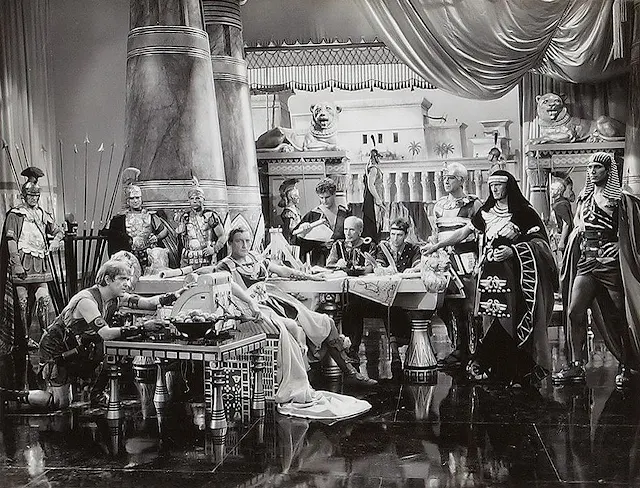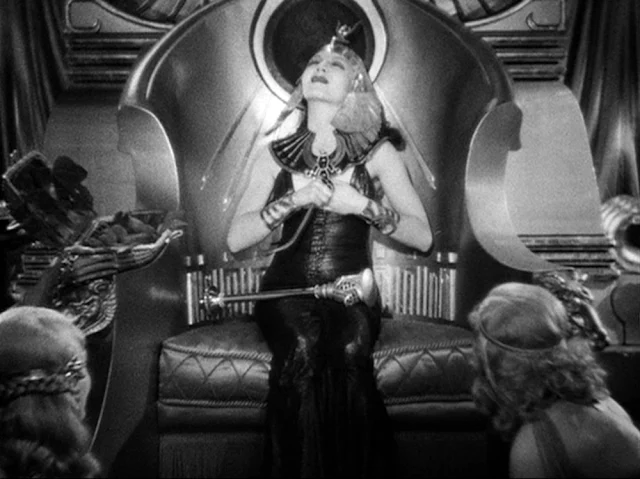Claudette Colbert's Cleopatra arrives rolled up in a rug and meets her end by clasping a rather limp garden snake to her bosom, and in between there's a lot of posing and tin-eared dialogue superimposed on the story told by Plutarch and Shakespeare. It won't do, of course, except for the camp extravagance of Hollywood awash in Cecil B. DeMille's usual sin, sex, and sadism. If the 1963 version of the story had been this entertainingly vulgar, it might have made money.
A blog formerly known as Bookishness / By Charles Matthews
"Dazzled by so many and such marvelous inventions, the people of Macondo ... became indignant over the living images that the prosperous merchant Bruno Crespi projected in the theater with the lion-head ticket windows, for a character who had died and was buried in one film and for whose misfortune tears had been shed would reappear alive and transformed into an Arab in the next one. The audience, who had paid two cents apiece to share the difficulties of the actors, would not tolerate that outlandish fraud and they broke up the seats. The mayor, at the urging of Bruno Crespi, explained in a proclamation that the cinema was a machine of illusions that did not merit the emotional outbursts of the audience. With that discouraging explanation many ... decided not to return to the movies, considering that they already had too many troubles of their own to weep over the acted-out misfortunes of imaginary beings."--Gabriel García Márquez, One Hundred Years of Solitude
Search This Blog
Thursday, February 27, 2025
Cleopatra (Cecil B. DeMille, 1934)
Wednesday, February 26, 2025
Melancholia (Lars von Trier, 2011)
This is the way the world ends in Lars von Trier's Melancholia: with a bang, as a rogue planet collides with Earth, and a whimper from the terrified Claire (Charlotte Gainsbourg) as she and her small son, Leo (Cameron Spurr), and more resigned sister, Justine (Kirsten Dunst), await the cataclysm. What this eschatological moment has to do with the dysfunctional wedding reception that constitutes the first half of the film is something for us to ponder. Or not, because there are many who dismiss the film as yet another of von Trier's perverse and enigmatic fables that have something to do with human passion and cruelty but defy explication. Is von Trier just playing around with the science fiction genre, the way he played around with the horror movie genre in Antichrist (2009) and the skin flick in Nymphomaniac (2013), the other two films that constitute his trilogy about depression? Or is it art for expiation's sake, a work that by existing defies its own nihilism? The debate continues.
Tuesday, February 25, 2025
Chilly Scenes of Winter (Joan Micklin Silver, 1979)
Cast: John Heard, Mary Beth Hurt, Peter Riegert, Kenneth McMillan, Gloria Grahame, Nora Heflin, Jerry Hardin, Tarah Nutter, Mark Metcalf, Allen Joseph, Frances Bay, Griffin Dunne. Screenplay: Joan Micklin Silver, based on a novel by Ann Beattie. Cinematography: Bobby Byrne. Production design: Peter Jamison. Film editing: Cynthia Scheider. Music: Ken Lauber.
Chilly Scenes of Winter is a kind of deconstructed screwball romantic comedy, meaning that it turns on the often comic efforts of a couple to overcome the dysfunction in their relationship. But the romance is soured and the comedy is darkened by circumstances they can't control, as well as their own egos. Initially released under the title Head Over Heels, it had a "happy ending" that felt unearned and it failed at the box office. Then writer-director Joan Micklin Silver revised the film a few years later, with a freeze-frame ending that left the protagonist in a kind of emotional limbo, and under the title of the Ann Beattie novel it was based on, it was better received. It's still full of cringe moments and skewed relationships, but in its own itchy way it makes dramatic sense.
Monday, February 24, 2025
Nosferatu (Robert Eggers, 2024)
Sunday, February 23, 2025
Wildcat (Ethan Hawke, 2023)
I wish there were more movies like Wildcat. Not that it's particularly good: Except for the acting, not much about it in conception and execution works very well. But it's made from the heart by someone with the status and income to see that it got made in an era when money (or lack of it) usually trumps love. It was born from Ethan Hawke's love for the stories of Flannery O'Connor, and maybe from the love for his daughter, Maya, who gives a fine performance as not only O'Connor but also some of the characters from her stories. It's this intermingling of O'Connor's life and fiction that proves to be the undoing of Wildcat, a brave idea undone by some bad ideas, like having Maya play a male character, Julian, in a section drawn from the story "Everything That Rises Must Converge." An unbilled cameo by Liam Neeson as a priest also stands out as a too-showy moment. But bravo to the Hawkes for a worthy effort.
Saturday, February 22, 2025
Flow (Gints Zilbalodis, 2024)
Lovely, wordless animated fable about a small gray cat who survives a catastrophic flood with the aid of a dog, a capybara, a ring-tailed lemur, and a secretary bird. Clearly a labor of love for its Latvian writer-director-cinematographer-editor-composer Gints Zilbalodis. Its digital animation lacks the finesse of fur and feathers we're used to in slicker, more sophisticated movies from the established studio animation factories, but it makes up for it in imagination and heart.
Friday, February 21, 2025
Down With Love (Peyton Reed, 2003)
Thursday, February 20, 2025
Crossing Delancey (Joan Micklin Silver, 1988)
Crossing Delancey is a likable ethnic-flavored romantic comedy whose plot hinges on whether the protagonist (Amy Irving) will choose between a phony (Jeroen Krabbé) and a mensch (Peter Riegert). What do you think? As usual in films with a foregone conclusion, enjoyment depends on lively performances and amusing situations. There are many of the latter, including the reactions of people attending a bris and the pretensions of people at a literary soirée. Reizl Bozyk is the film's standout performer as the grandmother of the protagonist, Isabelle. This was the only screen role for Bozyk, a mainstay of the Yiddish theater, and she infuses the busybody Bubbe with warmth. Her desire to see her granddaughter married leads her to enlist a flamboyant matchmaker, somewhat overplayed by Sylvia Miles. Thus Isabelle, who works in a bookstore and might seem a better fit with the handsome novelist played by Krabbé, finds herself in the company of Sam, the pickle merchant played by Riegert. But even if he has to cover up the pickle smell by soaking his hands in milk and vanilla extract, Sam has more to recommend him than just being an eligible Jewish suitor. The worlds-colliding situations are a little obvious, and the theatrical origins of the film show, but director Joan Micklin Silver has a sure hand throughout the film.
Wednesday, February 19, 2025
John Wick: Chapter 2 (Chad Stahelski, 2017)
Cast: Keanu Reeves, Riccardo Scamarcio, Ian McShane, Ruby Rose, Common, Claudia Gerini, Lance Reddick, Laurence Fishburne, Tobias Segal, John Leguizamo, Bridget Moynahan, Franco Nero, Peter Stormare. Screenplay: Derek Kolstad. Cinematography: Don Laustsen. Production design: Kevin Kavanaugh. Film editing: Evan Schiff. Music: Tyler Bates, Joel J. Richard.
"You've got a beautiful house, John," the villain (Riccardo Scamarcio) says to the hero (Keanu Reeves), and we silently think the rest: "Too bad if something happened to it." It does, of course, and we are back in the world of John Wick. Grimly stoic as usual, the protagonist takes a licking and keeps on John Wicking. Wickworld is a place with its own peculiar laws, one in which extremely violent things happen, from automobile demolition derbies to shootouts in the subway, and no authorities seem to intervene and passersby often don't even take notice. The choreographed violence becomes tolerable -- it's part ballet and part animated cartoon. In the extended fight between Wick and Cassian (Common), there's no sound but gunshots, blows landing, and combatants grunting, a kind of percussive duet that's as rhythmically compelling as Gene Krupa's drum solo on Benny Goodman's "Sing, Sing, Sing."
Tuesday, February 18, 2025
The Sisters Brothers (Jacques Audiard, 2018)
An American Western filtered through Gallic sensibilities, The Sisters Brothers was a box-office flop, but it remains one of the more intriguing movies of recent years. To its credit, it gives John C. Reilly another chance to show what a remarkable actor he is when he's given more than just a backup role to play; he somehow sends even such charismatic performers as Joaquin Phoenix, Jake Gyllenhaal, and Riz Ahmed into the background when he's on screen. Full of quirky dialogue and unexpected situations, the movie's chief flaws are that it feels a little longer than necessary and the narrative is occasionally more elliptical than necessary.























.jpeg)



.jpeg)


.jpeg)













.jpeg)

.jpg)





